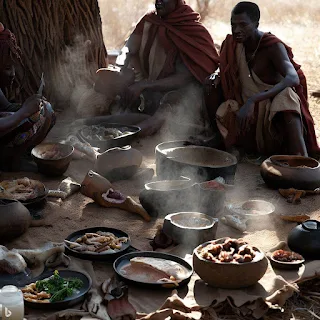The Hadza Tribe is a group of people who live in northern Tanzania, near the border of the Serengeti National Park. They are one of the last remaining hunter-gatherer societies in the world, and they have preserved a way of life that is similar to that of our ancestors 10,000 years ago. In this article, we will explore the fascinating culture, lifestyle, and diet of the Hadza Tribe, and learn how they can teach us valuable lessons about human health and happiness.
Who are the Hadza Tribe?
The Hadza Tribe, or Hadzabe, are an indigenous ethnic group that has lived in the same region for thousands of years. They speak a unique language called Hadzane, which has no known relation to any other language family. The Hadza Tribe’s population is estimated to be around 1,300 people, but only about 300 to 400 of them still follow the traditional hunter-gatherer lifestyle. The rest have adopted farming or pastoralism, or have moved to urban areas.
The Hadza Tribe’s culture is based on egalitarianism, cooperation, and sharing. They have no formal leaders, no social classes, no permanent settlements, and no private property. They live in small groups of 20 to 30 people, called camps, that move frequently according to the availability of food and water. They share everything they have with each other, and they have a strong sense of community and belonging.
What do the Hadza Tribe eat?
The Hadza Tribe’s diet is mainly composed of meat from hunting, honey from wild bees, tubers from digging, and fruits and berries from gathering. They do not cultivate any crops, nor do they keep any livestock. They eat what they find in their natural environment, and they do not store or process any food. They eat a variety of foods depending on the season and location, but they generally consume more meat and honey than plants.
The Hadza Tribe’s diet is often compared to the Paleolithic diet, which is based on the assumption that humans are genetically adapted to eat what our ancestors ate before the advent of agriculture. The Paleolithic diet advocates eating foods such as meat, fish, eggs, nuts, seeds, fruits, and vegetables, while avoiding foods such as grains, legumes, dairy products, refined sugars, and processed oils. The Paleolithic diet claims to offer many health benefits, such as weight loss, improved blood sugar levels, lower inflammation, and reduced risk of chronic diseases.
How do the Hadza Tribe live?
The Hadza Tribe’s lifestyle is characterized by physical activity, social interaction, and exposure to nature. They spend most of their time outdoors, walking long distances every day to hunt or gather food. They use simple tools made from wood, stone, or bone, such as bows and arrows for hunting animals or digging sticks for extracting tubers. They make temporary shelters from grass and branches that can be easily dismantled and moved.
The Hadza Tribe’s lifestyle is also marked by a high degree of social interaction and communication. They spend a lot of time talking, laughing, singing, dancing, storytelling, and playing games with each other. They have a rich oral tradition that preserves their history and values. They also have a close relationship with nature and respect for all living beings. They do not kill more animals than they need for food or clothing. They do not waste any part of the animal they kill. They also believe in a spiritual connection between humans and nature.
What can we learn from the Hadza Tribe?
The Hadza Tribe’s way of life offers us a glimpse into our past and a possible alternative for our future. Their culture challenges some of the assumptions and norms that we take for granted in our modern society. Their diet questions some of the dietary guidelines and recommendations that we follow in our nutrition science. Their lifestyle inspires us to rethink some of the habits and choices that we make in our daily lives.
The Hadza Tribe’s example shows us that there is more than one way to live as humans on this planet. It also reminds us that we are not separate from nature but part of it. It also teaches us that happiness does not depend on material possessions or social status but on meaningful relationships and experiences.







No comments:
Post a Comment